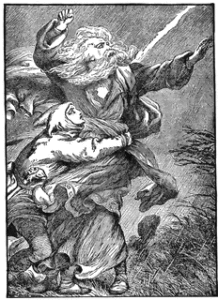
The most popular post I’ve ever made is the one depicting Shakespeare’s works as a Venn Diagram (although technically that shape is an Euler Diagram). That post on Facebook has garnered over 2 million views at this point, and hundreds of comments. People have asked me if it is available as a poster (as far as I know it is not – I did not create the original image).
The problem is, I don’t like it. Most of the comments are of the form “Why do you have play X in this category but not that one?” and “You forgot to put Y in the Z category” and so on. The categories (Suicide, War, Romance, Supernatural) are, I think, too broad. Does Romeo and Juliet count as war between the two families? I would say no, but some people disagree. How about Much Ado About Nothing? It starts with the men coming home from war.
So here’s what I propose. Can we make a better one, or a set of better ones? Something that more people can agree on? If we can make something that’s generally agreeable to a large audience I’ll be happy to make it available as a poster / stickers / t-shirt / etc…
I’ve been working with Bardfilm on some new categories. The goal would be to find a set such that:
- All plays are represented by at least one category.
- Minimize the number of categories that have no entries.
- No single category has too many entries.
What categories would you like to see? “Supernatural” made our list as well. I was thinking “Insanity” might be a good one. Bardfilm proposed “Fake Deaths” and “Cross-Dressing”. If we can’t agree across all the categories we can look at doing one for Comedy, one for Tragedy, one for History, but I think those would end up looking a little sparse, and I’d feel bad about leaving out Romance.
What other ideas have you got for us? Tell us the category you think should be on our diagram, and which plays would be in it.


 Now if you told me, in a year when I was alive, that a Shakespeare production was sweeping the night? I’d watch the whole thing with popcorn. Probably call some friends.
Now if you told me, in a year when I was alive, that a Shakespeare production was sweeping the night? I’d watch the whole thing with popcorn. Probably call some friends. Anybody that knows me knows that when I see a post titled 1000 Most Mentioned Books on Reddit (or, really, anywhere), the first thing I’m going to do is search it to see where Shakespeare shows up. Any guesses?
Anybody that knows me knows that when I see a post titled 1000 Most Mentioned Books on Reddit (or, really, anywhere), the first thing I’m going to do is search it to see where Shakespeare shows up. Any guesses?